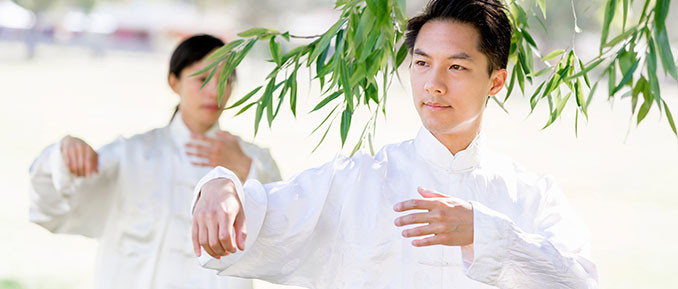
Cloud hands, single whip, white crane spreads wings – you’ve probably never heard of these terms unless you practice tai chi, an ancient Chinese tradition that focuses on “meditation in motion.” Tai chi in modern form reduces stress and anxiety as well as improves balance and strength all through special movements often named after animals, combined with deep breathing, relaxation techniques, and a tranquil state of mind.
Tai chi has great depth and history, but is easy to learn for those just beginning. The exercise can improve cardiovascular fitness, reduce blood pressure, and alleviate stress. It has even been used for its antiaging effects, and has previously improved oxidative stress response and DNA damage and repair in women. Plus, research shows that it might have the power to change marks on your DNA and ultimately influence the expression of genes.
A group of researchers from Australia assessed an epigenetic tag called DNA methylation, which is known to control gene expression. Methyl groups attach to certain genes – in this case, those related to aging – and control whether they are expressed or not. In this preliminary study, they investigated the pattern of DNA methylation at 60 specific CpG sites previously associated with age-related variations within the genome.
Over 200 women who had been practicing tai chi for 3 years were recruited for this study. Their methylation profiles were compared to women who had never practiced tai chi. Researchers found that for those who did practice, DNA methylation was less in four CpG areas and higher in two others.
“In the tai chi cohort all six marks demonstrate significant slowing (by 5–70%) of the age-related methylation losses or gains observed in the controls, suggesting that tai chi practice may be associated with measurable beneficial epigenetic changes,” the researchers stated.
Similarly, it is known that yoga may have an epigenetic basis to improving health. Those who practice yoga might have a reduction of a certain epigenetic mark on a gene linked to inflammation. Meditation, in addition to its longstanding health benefits, may also lead to epigenetic influences on well-being. Tai chi incorporates essential aspects of both of these practices.
“This work has provided preliminary evidence that tai chi practice may be associated with measurable beneficial epigenetic changes,” the group reported. “The ability to measure such changes at the molecular level opens up the possibility of designing new and objective approaches that can be used to delineate the biological mechanisms and the health and therapeutic efficacies of tai chi.”
In light of these results, it’s safe to say that tai chi may induce beneficial epigenetic changes that are worthy of further investigation. The thoughtful and purposeful movements of this ancient practice might be a simple way to improve numerous aspects of the body and wellbeing through harnessing the power of epigenetics.
Source: Ren, H. (2012). Epigenetic Changes in Response to Tai Chi Practice: A Pilot Investigation of DNA Methylation Marks. Evidence-Based Complementary and Alternative Medicine.


